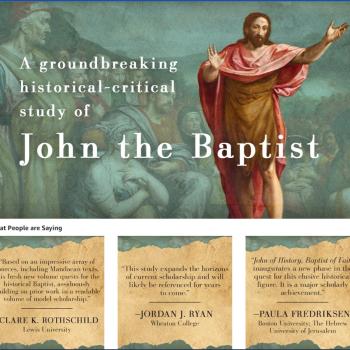This seems like a natural place to go after my recent post about John’s Christology. As I emphasized already in my first book, John’s Apologetic Christology, there are significant continuities between John and earlier texts, however much we think he may have developed things. Some but by no means all of this relates to Christology, and if the preponderance does it is itself indicative of the fact that the earliest and latest Gospels share a focus on Jesus, however different the language and imagery used.
Here I want to focus on a point of continuity that I touch on in my book John’s Apologetic Christology, but also connect that with my current project related to John the Baptist. The accusation in the Synoptics that Jesus is a “glutton and a drunkard” echoes language from Deuteronomy and thus accuses him of being a rebellious son. As I mention in my book, but explore in more detail in an article in New Testament Studies, John 5 seems to be focused on defending Jesus against the accusation of being a rebellious son. The claim that he “makes himself equal to” his Father indicates that this is the issue.
What I’d like to explore here is the significance of the Synoptic saying, when connected with Deuteronomy, given that it is also part of a contrast or comparison between Jesus and John. Were both accused of being rebellious sons, or only Jesus? John’s baptism for forgiveness would likely have set him at odds with his father who was a priest. Mandaean sources suggest as much. (The reference to Zechariah divorcing Elizabeth in Book of John 32 for going out without a veil when she hears that John has returned could be taken to indicate that he divorced her ultimately over her support for John.) John’s departure from the world of eating and drinking might refer to his relocation to the Jordan River and other such locations, which not only forewent normal social interaction but also passed on the meat that was his portion if he followed in his father’s footsteps and performed sacrifices in the temple as a priest. Indeed, given that meat was a rarity and most that was consumed was from animals offered as sacrifices, it may be that the point of contrast between John and Jesus is that the former avoided even meat associated with temple sacrifice while Jesus did not. Among Jesus’ followers we find some who frequented the temple while it still stood, while others rejected animal sacrifice altogether. Those Jewish Christians (sometimes referred to as Ebionites) were also remembered as having been vegetarians. Could they have assumed that Jesus’ efforts at outreach through sharing of meals were not something that his followers, once they became his followers, were to emulate? (Simon Joseph’s article in the Journal of the Jesus Movement in its Jewish Setting about this deserves to be considered in relation not only to Jesus and his followers but John the Baptist as well.)
Could the accusation against both, or at least the issue, ultimately be the same? John’s asceticism left room to attribute his rebellion, his following of a course his father disapproved of and that put him at odds not only with his father’s hereditary vocation and his own but sacrificial priesthood itself, to a demon. Jesus is met with the same accusation throughout the Gospels and so there isn’t a contrast on that point. Assuming the Son of Man reference is self-referential, perhaps the point is that Jesus associated with people that his own father disapproved of, and so dishonored his father just as John dishonored his? Or is it a more vague statement that could mean “someone (else besides John) comes eating and drinking? Even that could include an indirect self-reference: someone else, for example me, comes eating and drinking. (On the lips of Jesus the statement about “someone” could perhaps have been a hypothetical—if John himself had been different they still would have found a way to criticize him. That seems less likely but is worth mentioning and perhaps investigating further.)
I am beginning to think that past interpreters have overplayed the contrast that is being made. Both are being accused of shaming and rebelling against their fathers. Jesus says they are Wisdom’s children. This suggests a possible counterargument to the accusations. If Wisdom finds them obedient, how can they be “rebellious sons”? Is “sons of wisdom” merely a Semitic idiom for being wise? If so then on that level the meaning is that the wise are vindicated. Perhaps it is a multilayered pun, as we might expect from Jesus. Wisdom vindicates her children and they her.
There are details I hope to dig into as I explore this further. Is the “all” in Luke 7:35 likely to be part of what Jesus said? What would the saying be in Palestinian Aramaic? (In Syriac is it ܘܐܙܕܕܩܬ ܚܟܡܬܐ ܡܢ ܟܠܗܘܢ ܒܢܝܗ.)
I suspect there may be an article here worth writing. It is definitely something to work into my book on John the Baptist. I would value thoughts and input on this if you are so inclined!
Of related interest, here are other things that have come to my attention recently related to John the Baptist. Let me begin with two fantastic videos about the Mandaeans, one part of Andrew Henry’s wonderful Religion for Breakfast series, the other Charles Häberl’s recent AAR conference paper. Other links follow below the videos.
https://www.episcopalcafe.com/leveling-mountains-exalting-valleys/?utm_source=rss&utm_medium=rss&utm_campaign=leveling-mountains-exalting-valleys
https://readingthebiblewithigen.home.blog/2020/12/10/john-the-baptist-the-prophetic-tradition-and-the-educators-vocation/
Blessed are the Promise Believers
John the Baptist, Jesus, and the Dead Sea Scrolls: A “Cosmic Messiah” Who Raises the Dead?
https://www.episcopalcafe.com/faith-to-go-the-one-doing-the-pointing/?utm_source=feedly&utm_medium=rss&utm_campaign=faith-to-go-the-one-doing-the-pointing
Prepared with Water and Spirit













